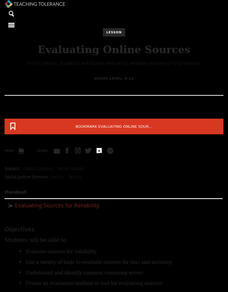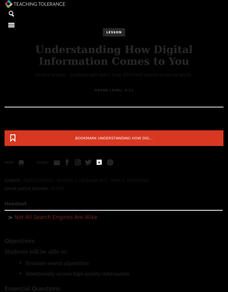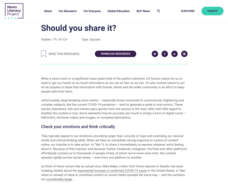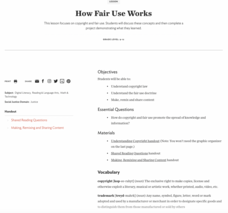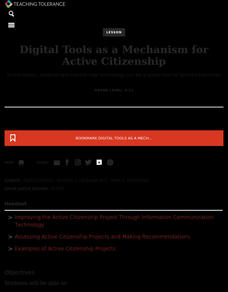Teaching Tolerance
Civic Engagement and Communication as Digital Community Members
Don't feed the Internet trolls! Using a thought-provoking resource, pupils brainstorm a whole-class list of the possible kinds of bias young people may experience online. Next, in small groups, scholars create posters illustrating how to...
Teaching Tolerance
Constructively Engaging in Digital Communities
Say no to hate speech! Pupils discover the importance of practicing empathy and inclusivity in digital communities and discuss strategies for responding to online hate speech. Then, small groups develop and present class guidelines for...
Teaching Tolerance
Evaluating Online Sources
Newspapers, television, social media ... how do people get their news? Using the informative resource, scholars locate and verify credible sources of information. Working in small groups, they discuss strategies for evaluating the...
Nemours KidsHealth
Cyberbullying: Grades 9-12
A bully, a victim, and a bystander—far from the beginning of a joke, cyberbullying is no laughing matter. Bystander or upstander? As part of the study of cyberbullying, high schoolers first read a series of articles about cyberbullying...
Teaching Tolerance
Understanding and Evaluating Online Searches
With billions of options to choose from, how can people determine which online sources are reliable? Using an informative resource, pupils first discuss and evaluate a sample search result handout. Next, partners create a checklist for...
Teaching Tolerance
Understanding How Digital Information Comes to You
Google, Yahoo!, Bing ... so many choices, so little time! Using the resource, scholars explore how different search engines affect the way they find information. After reading a handout on the topic and engaging in small group...
Nemours KidsHealth
Online Safety: Grades 9-12
Teach teens how to protect themselves from hackers, scammers, and online predators. First, class members examine their own digital footprints think critically about their online profile. Groups then generate lists of "do" and "don't do"...
Nemours KidsHealth
Media Literacy and Health: Grades 9-12
An essential skill for 21st-century learners is to know how to find reliable sources of information. Two activities help high schoolers learn how to determine the reliability of health-related news from websites, TV, magazines, or...
Nemours KidsHealth
Screen Time: Grades 9-12
Two engaging activities encourage teens to turn off their screens and tune into healthy activities. Learners use a tracker to assess their daily screen-time habits, read several articles about the value of exercise, then research the...
News Literacy Project
Should You Share It?
Sharing isn't always caring. Scholars learn how to reduce the spread of misinformation on the Internet. They take an online quiz of example posts targeted to a specific audience. Using critical thinking skills, they see if they can tell...
News Literacy Project
Fighting Falsehoods on Social Media
It's time to stop misinformation in its tracks. Scholars take an online quiz to see how well they understand social media platforms' policies on spreading false information. After taking the quiz, pupils receive a score with an...
Nemours KidsHealth
Media Literacy and Health: Grades 6-8
Internet suffers could drown in the volume of information available on line. Here's an activity that can be a lifeline and buoy confidence in middle schoolers' ability to find reliable information and credible sources. After reading...
EngageNY
Using Effective Search Terms: Researching Screen Time
The proof is in the reading. Scholars read an article, "Attached to Technology and Paying the Price," and answer text-dependent questions. Next, they complete a Venn diagram to contrast two authors' use of evidence on the topic of screen...
Teaching Tolerance
How Online Communication Affects Privacy and Security
Digital footprints leave a lot of clues behind! Pupils discuss the positives and negatives of having a digital footprint and what it means. Then, using a handout, scholars learn ways to protect their online privacy.
Teaching Tolerance
How Fair Use Works
What's fair is fair! Using the resource, scholars discuss the key differences between fair use and copyright. Next, in small groups, pupils create and present projects that demonstrate fair use of copyrighted material, such as a song,...
Teaching Tolerance
Digital Tools as a Mechanism for Active Citizenship
How is technology a useful tool for active citizenship? Pupils assume the role of technology consultants reviewing citizenship projects. Small groups collaborate to make recommendations about how to incorporate technology to improve...
Teaching Tolerance
News Consumers' Bill of Rights and Responsibilities
Believe it or not, people have rights as new consumers. Scholars read PEN America's News Consumers' Bill of Rights and Responsibilities and work in small groups to paraphrase chosen sections of the text. Next, they create and present...
Teaching Tolerance
Tweeting for Change
Do some good with social media. Secondary scholars participate in a live Twitter chat focusing on social justice issues. The thought-provoking activity allows academics to set up a live chat, create responses, and express their personal...
Teaching Tolerance
You Are the Product
What does it mean for a product or service to go viral? Scholars explore the topic by reading an article about the economics of social media. After reading, they complete a 3-2-1 data chart with information they learned from the text and...
Teaching Tolerance
Media Consumers and Creators, What Are Your Rights and Responsibilities?
Teach the class to separate fact from fiction. Scholars explore the topic of fake news as they read PEN America's News Consumers' Bill of Rights and discuss the rights and responsibilities outlined in the bill. Next, they read an article...
Purdue University
Email Etiquette for Students
What's the best way to discuss a problem or concern with a professor? Using a helpful PowerPoint, scholars learn how to use e-mail to communicate effectively with their instructors. They discover good and bad e-mail topics, appropriate...
Facebook
Pop Imagination
Popular culture can pack a powerful punch when it comes to creating awareness around an issue! Teams collaborate to create a pop-culture-themed message during a digital citizenship instructional activity. Part of a vast library of...
Facebook
Raising Awareness Through Media
Spread the word! Passionate pupils engage in creating multimedia awareness messages during a digital citizenship lesson plan. Using an example of a community social issue message for ideas, individuals then take the reins and begin to...
Facebook
Building Your Activist Network
Can social media bring activists together? Learners gain experience in using online media tools to raise awareness during a hands-on activity from a digital citizenship library. Once they identify a cause, groups create a unified message...




